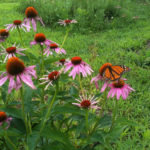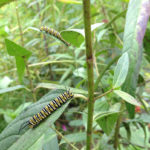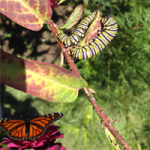Monarch sightings 2018:
 It’s June 1, 2018 and we haven’t seen any Monarch yet—but we have a larger-than-last-year crop of milkweed plants appearing naturalized across the farm. Last year, we were encouraged at the Monarch “traffic,” and we heard from customers that their projects have yielded Monarch caterpillars as well! In parts of the farm where we have fewer flowers planted, we saw Monarchs on pussy willow, red clover and sunflowers.
It’s June 1, 2018 and we haven’t seen any Monarch yet—but we have a larger-than-last-year crop of milkweed plants appearing naturalized across the farm. Last year, we were encouraged at the Monarch “traffic,” and we heard from customers that their projects have yielded Monarch caterpillars as well! In parts of the farm where we have fewer flowers planted, we saw Monarchs on pussy willow, red clover and sunflowers.
Our first sighting is usually after June 15. Then as of mid-July, sightings became more frequent. As of mid-August, we expect to see Monarchs every day! In addition to visiting multiple Asclepias plants, these adults have been seen sipping from Zinnias, Tithonia (Mexican sunflowers), Comfrey, Eupatorium (Joe Pye Weed), Echinacea, Veronicastrum…
We are grateful to all who have purchased seeds from us to help strengthen the Monarch corridor up the east coast.
Milkweed is the only plant on which Monarch butterflies lay their eggs.
 As of spring 2014, reports documented that milkweed—which used to be common along the edges of farmland—has been mostly eliminated from the central U.S. due to modern mega-farming. Our farm—and our seed customers!—are part of an effort to restore Monarch migration corridors in the U.S.
As of spring 2014, reports documented that milkweed—which used to be common along the edges of farmland—has been mostly eliminated from the central U.S. due to modern mega-farming. Our farm—and our seed customers!—are part of an effort to restore Monarch migration corridors in the U.S.
Adult Monarchs need more than milkweed.
Adult Monarch butterflies need sources of nectar for strength and good health. They prefer to stand on broad, flat blossoms as they sip. In our pollinator habitat, we have observed that adult Monarchs lay their eggs on the asclepias plants, and feed on other nectary flowers.
We offer for sale seeds of two varieties of Milkweed (Asclepias) and a collection we call the Monarch Supplement (three varieties of flowers our Monarchs love). We suggest you plant them together.
Please plan to save seeds from your plantings and help spread them to others. These are open-pollinated seeds, and perennials. Some plants may not appear until the second year.
Buy Milkweed Seeds (or seedlings, if you’re local)
We are offering seeds we hand collected from our pollinator habitat in Hadley, Massachusetts (Zone 6) (Asclepias incarnata and Asclepias syriaca).
PLEASE NOTE: Milkweed seeds should not be eaten, and the milky sap of the plant can irritate the eye. The reason Monarchs rely on milkweed for their young is that toxins in the milkweed plant render the caterpillars and butterflies toxic to vertebrate Monarch predators such as birds and mice!
Plant spacing is one plant per 1–2 ft.
We planted trays of 300+ seedlings for summer 2018. Instead of selling them as we had intended, mother Monarchs went crazy, laid eggs on most of those, and when those little caterpillars hatched, they consumed the entire crop!
If you want a great project for your school, camp, or gardening group in 2019, consider pre-ordering our seedlings and their companion plants (zinnias, tithonia, or echinacea). NOTE: We will plant these trays in January, so you can plant them in late May/early June. Email us to reserve your trays during the dark days of December and January! Sorry, we cannot ship seedlings. Contact us with your questions and ideas: email thatsaplentyfarm@gmail.com or call Michael’s cell: 413.320.5953
Then buy the Monarch Supplement
 A collection of three proven Monarch butterfly favorites: Giant zinnias, Mexican sunflowers (Tithonia), and Purple coneflower (Echinacea purpurea). On our farm, these three plants bloom in overlapping succession (Echinacea, Zinnia, Tithonia), and provide nectar calories to the adult Monarchs all the way through the season until frost.
A collection of three proven Monarch butterfly favorites: Giant zinnias, Mexican sunflowers (Tithonia), and Purple coneflower (Echinacea purpurea). On our farm, these three plants bloom in overlapping succession (Echinacea, Zinnia, Tithonia), and provide nectar calories to the adult Monarchs all the way through the season until frost.
The image above shows an adult Monarch sipping from a zinnia as two Monarch caterpillars munch on milkweed. Read more about this collection in the “Shop”.
Click “STORE” in the top menu to purchase milkweed seeds.
Questions? email thatsaplentyfarm@gmail.com
